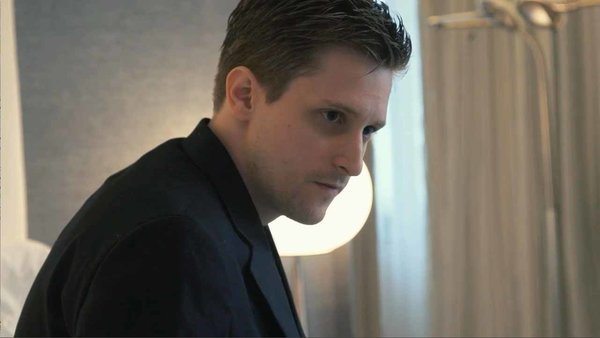
 "It's not science fiction," says Edward Snowden, in reference to the NSA's secretive gathering of metadata. "This stuff is happening right now." Laura Poitras's documentary Citizenfour is verité in the purest sense, being that everything you see in the film is developed on the fly, as she pursues, or rather, is pursued by an anonymous source. She started making this film without any real indication of where it would lead, and the uncertainty is palpable while you watch it unfold.
"It's not science fiction," says Edward Snowden, in reference to the NSA's secretive gathering of metadata. "This stuff is happening right now." Laura Poitras's documentary Citizenfour is verité in the purest sense, being that everything you see in the film is developed on the fly, as she pursues, or rather, is pursued by an anonymous source. She started making this film without any real indication of where it would lead, and the uncertainty is palpable while you watch it unfold.
This is not an objective documentary, and Poitras knows this because she, the filmmaker, is in the film. Snowden, referring to himself under the pseudonym "CITIZENFOUR," selected Poitras and journalist Glenn Greenwald to assist him with the leak – not the other way around. And so, yes, those who have a hard time with Snowden and the idea of whistleblowing will bristle at most of the arguments presented in the film. There's plenty of debate to be had about the implications of whistleblowing and the handling of sensitive information, and the film is palatably dense with statistics and information. Still, Citizenfour is successful for a number of reasons – none of which have anything to do with being on the right or wrong side of the political argument.
Poitras, in The Oath and Flag Wars has demonstrated her enthusiasm for verité filmmaking, and I think because her presence in Citizenfour was unavoidable she decided to curtail signs of artifice wherever possible. The film is hauntingly quiet – there are a few tracks by Trent Reznor in the beginning and at the end. Additionally, about a full hour of the film takes place in a single Hong Kong hotel room in which the journalists were able to covertly meet with Snowden. There is pressure in that containment. Is the government onto them? How are they going to get out of this? Although there are some exceptional shots of Hong Kong and Latin America that tie everything together, the film is very stylistically matte. This is all apt, being that the focus of Citizenfour is on the journalistic process of exposing classified information as well as Snowden's personal story himself. Yet, as culturally and politically significant the issue of privacy is, the most compelling thing about Citizenfour is by far Snowden.
We see him anxiously trying to get in touch with his girlfriend to make sure she is safe. We laugh with him and Greenwald, nervously and terrified, as a fire alarm goes off in the hotel room. We hear him talk with conviction about how he believes the public needs to be aware of a government that oversteps its allocated power. We watch him attempt to disguise himself in preparation to leave Hong Kong, all while his face his hovering on CNN in the background. Snowden is charismatic, intelligent, humble, and brave, and Poitras shows us these facets of his personality without getting political. Incidentally, the normal and endearing qualities Snowden possesses when considered with the enormity of what he was willing to risk, actually makes him a truly compelling argument in favor of whistleblowing.
So, Citizenfour isn't really shy about presenting one side of the argument – Snowden's side. With Snowden's personal tale as engrossing as it is, I can't see how anyone can complain, though, regardless of political affiliations. Poitras and her team follow things as they happen, and by default, so does the audience. It's as unnerving and nail-bitingly good as the best of Hollywood's thrillers – and all the more thrilling that there's nothing Hollywood about it.